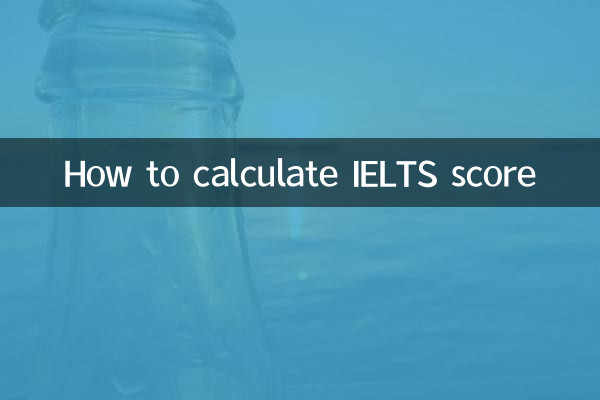How to calculate IELTS score
IELTS is the abbreviation of International English Language Testing System and is widely used in fields such as study abroad, immigration and professional certification. Many candidates are confused about how IELTS scores are calculated. This article will analyze the IELTS scoring standards in detail and provide structured data to help candidates better understand.
1. IELTS test structure

The IELTS test is divided into four parts: Listening, Reading, Writing and Speaking. Each part is worth 9 points, and the final total score is the average of the four parts.
| exam part | Full marks | Scoring criteria |
|---|---|---|
| hearing | 9 points | 40 questions, 1 point for each question, calculated based on the number of correct questions |
| read | 9 points | 40 questions, 1 point for each question, calculated based on the number of correct questions |
| writing | 9 points | Scored based on task completion, coherence, vocabulary and grammar |
| spoken language | 9 points | Scored on fluency, vocabulary, grammar and pronunciation |
2. IELTS score calculation method
The overall IELTS score is the average of the four sections, rounded to the nearest 0.5 point or whole point. For example:
| hearing | read | writing | spoken language | average score | total score |
|---|---|---|---|---|---|
| 6.5 | 7.0 | 6.0 | 7.5 | 6.75 | 7.0 |
| 5.5 | 6.0 | 5.0 | 6.5 | 5.75 | 6.0 |
3. Score conversion for listening and reading
The listening and reading sections each have 40 questions, worth 1 point each. The following is the official score conversion table provided by IELTS:
| Number of correct questions (listening/reading) | Corresponding Score (Academic) | Corresponding score (training category) |
|---|---|---|
| 39-40 | 9.0 | 9.0 |
| 37-38 | 8.5 | 8.5 |
| 35-36 | 8.0 | 8.0 |
| 33-34 | 7.5 | 7.5 |
| 30-32 | 7.0 | 7.0 |
4. Scoring criteria for writing and speaking
The writing and speaking components are scored by examiners according to the following criteria:
| Rating dimensions | writing | spoken language |
|---|---|---|
| task completion | Have you fully responded to the question requirements? | not applicable |
| coherence and connection | The logic is clear and the paragraphs are connected naturally. | Fluent expression and logical coherence |
| lexical diversity | Rich and accurate vocabulary | Flexible use of vocabulary |
| grammatical accuracy | Grammatical structures are diverse and correct | Fewer grammatical errors |
5. How to improve IELTS score?
If you want to improve your IELTS score, candidates can start from the following aspects:
(1) Listening:Listen to English radio, news, movies and TV dramas to become familiar with different accents and speaking speeds.
(2) Reading:Expand your vocabulary and practice your ability to read quickly and locate key information.
(3) Writing:Write more and practice more, paying attention to logical structure and grammatical accuracy.
(4) Spoken English:Communicate with native speakers and simulate exam scenarios to improve your fluency.
Although the calculation method of IELTS scores is complicated, candidates can achieve ideal scores through systematic study and targeted practice. I hope the analysis in this article can help you better prepare for the IELTS exam!

check the details

check the details